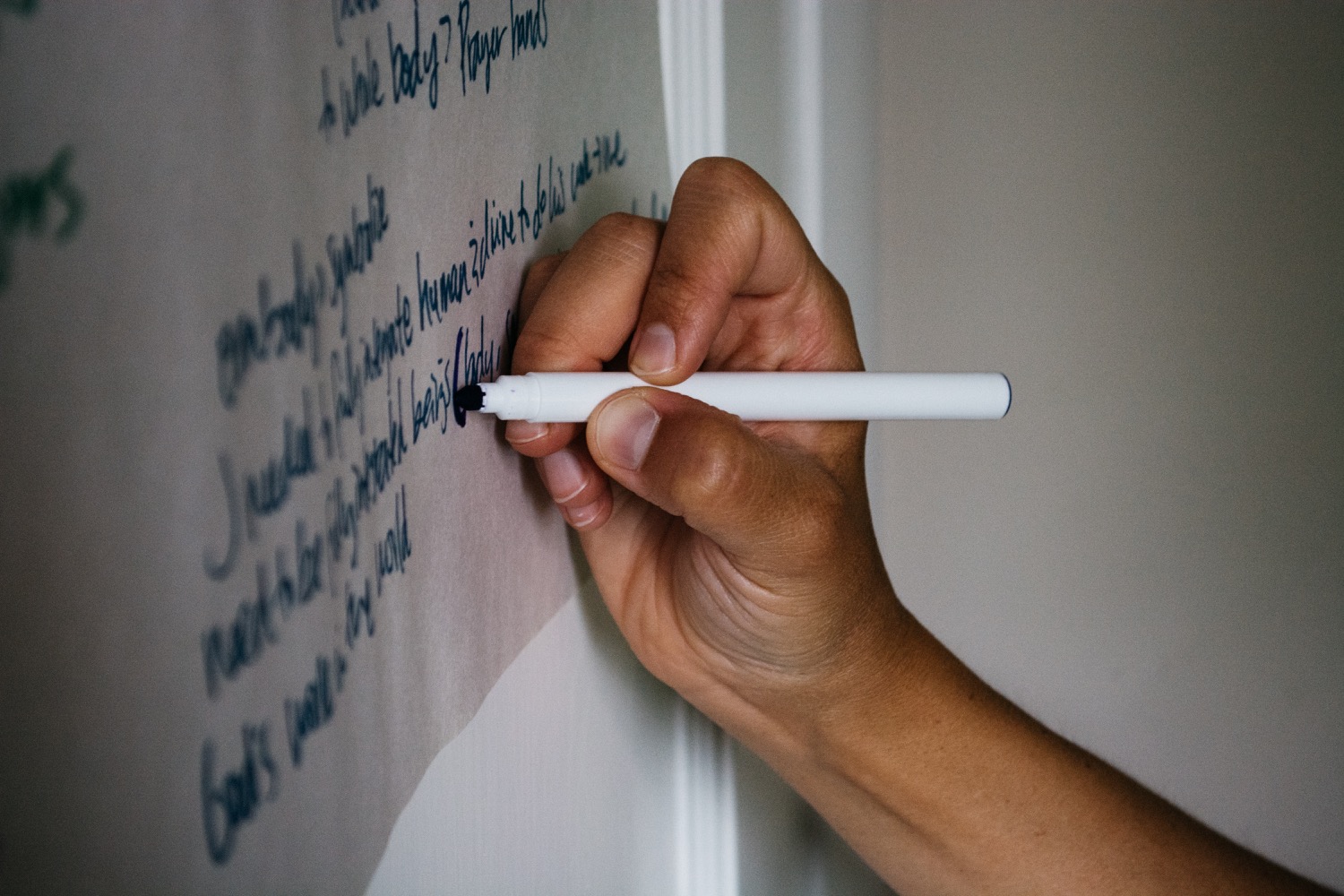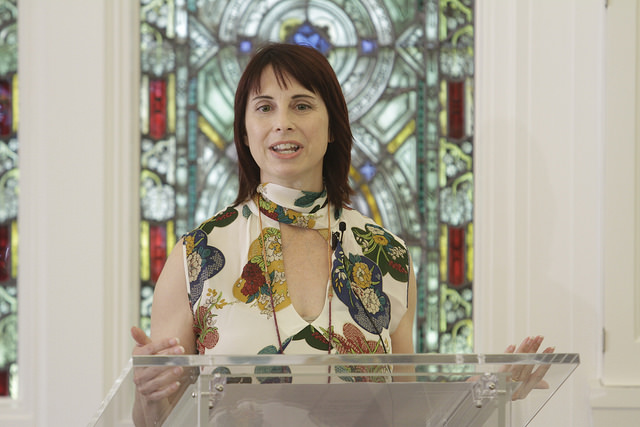From Scraps and Scribbles—wholeheARTed guest, Rev. Nadine Ellsworth-Moran
Scraps and scribbles. The corners of receipts and the edges of envelopes. Idle moments in traffic. A stroll down the grocery aisle.
Inspiration has no grand arrival—she shows up in spurts, often beyond the realm of convenience, announcing herself to you. The question is not if inspiration will show up; the question is if you'll be attentive enough to notice and courageous enough to respond.
“If you bring forth what is within you, what you bring forth will save you. If you don’t bring forth what is within you, what you don’t bring forth will destroy you. ”
Our wholeheARTed guest this week, Rev. Nadine Ellsworth-Moran, takes seriously what it means to respond to inspiration when she arrives. Multi-vocational in her ministry, working in both the parish and theological education, Nadine folds her creative writing into her life of faith.
Read on for more and be sure to catch up on our previous wholeheARTed guests here.
SA: When did you first consider yourself an artist or creative person?
NEM: I haven’t exactly followed an expeditious path to claiming my writing as art or myself as a poet (think: molasses or glaciers). However, since I was continually drawn to it, a few years ago I signed up for my first writing conference. After it was too late to back out, I realized it was a critique workshop wherein you present your own original work for review. Having never written poems of my own (unless I wanted to bring in one from a sixth grade school project or angst-ridden high school girl scribblings), I had no choice but to try to do what I’d only imagined in my head, write poems. I made it through that workshop relatively unscathed (due to much grace on behalf of my classmates) and with enough encouragement to push on, but I wasn’t ready to call myself a poet. That was several years ago now, and to be honest, I still struggle with the title. Yet, along the way I fell in love with the art of words and realized poetry was at the heart of my creative identity. I am still uncomfortable when anyone refers to me as a “poet,” perhaps because I know I still have so much to learn. Then there are times when a poem really comes together, says what I want it to say yet speaks with its own voice. That’s when I think, yeah, I am a poet, if only for this moment.
SA: Tell us about the art you create or how you express yourself creatively.
NEM: My art revolves around the written and spoken word that I use to create images, tell stories, provoke, question, and open dialogue. Although I enjoy other genres of writing, my first love is poetry. I relish the economy of words poetry requires and the challenge of creating something whole in just a few lines. I am also enamored with poetry’s fluidity, as it shifts between the visual and the spoken through the white space and the form words take on the page. It is constant movement and interplay.
SA: What is your creative process like?
NEM: My creative and editing process involves a fair amount of coffee! Although there is a lot to be said for a designated writing schedule, my process for writing poetry generally involves random scraps of paper, receipts, billing envelopes and old grocery bags with bits and pieces of lines or stanzas written on them. When a beautiful line or powerful image pops into my head, I find that I must write it down in that moment or I will never remember it quite the same way. Driving presents a problem since I often get ideas in the car—thank goodness for voice-activated note apps that let you dictate! From scraps and scribbles often come full poems. Once a poem gets drafted, it usually needs to be left alone to “marinate” for a while before I start to tinker with it. A poem may take a day, a week, a year or more to complete. This may seem like a long time for what could be a short poem, but the art of writing is often found in the smallest of details—a comma, a line break, or one word choice that makes all the difference.
“My process for writing poetry generally involves random scraps of paper, receipts, billing envelopes and old grocery bags with bits and pieces of lines or stanzas written on them . . . From scraps and scribbles often come full poems.”
SA: What does fear look like for you and how does it show up in your creative process?
NEM: I think fear for writers of any genre comes in three broad forms:
One—not being able to express the thoughts or images in your head in a meaningful way.
Two—once written, having your work misunderstood or rejected, whether by a publisher, writing group, or (gasp!) even your friends.
The third—and perhaps most pervasive fear—is contracting permanent writer’s block. It’s real, y’all. So real. At least the fear is real and it can sometimes bring all creative efforts to a screeching halt. Writer’s block doesn’t exactly surface in your work, it’s just a frightening lack thereof!
SA: How do you push beyond fear and self-doubt when they emerge during the creative process?
NEM: Often simply going back to read some of my favorite writers helps me work through my own fears and doubts. I also have a writing community to whom I turn when I start to doubt myself, need feedback, or get stuck. It also helps to return to very basic practices of writing from prompts or free writing. Just letting something spill out no matter how trite or uneven it may be activates that creative muscle memory and helps me move past any fears or negativity and remember the joy inherent in the art of writing for me.
SA: How is your creativity connected to your faith?
NEM: As Romans 12: 6a says, “We have different gifts, according to the grace given to each of us.” I believe the ability to create and imagine is a gift, and we are called and encouraged to use that gift for good purposes—to bring joy, empathy, healing, questions, or a myriad of other purposes art may provide. My writing and my faith are intimately joined from beginning to end. I may or may not be engaging an overtly religious subject, but whatever I am trying to express is filtered through that lens of faith. Even when a piece is dark or unsettling, my faith is where I will go first in order to try and interpret it for myself before I attempt to write about it. In all my poems, even “secular” ones, there is a theological underpinning. I find that when I open myself to the wild and wonderful imaginings of God, I see infinite possibilities for expressing my faith and demonstrating my love for God in the sharing of my particular artistic gift.
SA: How does creativity/art lead you to wholeness?
NEM: Writing allows me to say things I might never be able to express in any other way or be willing to talk about in any other form. Poetry, in particular, often brings me into dialogue with God and the resulting creative work is, therefore, always ultimately hopeful. I believe my writing brings me wholeness because it allows an otherwise hidden gift to bloom and send roots deeper and broader through all aspects of my life. While I find wholeness in creating poems, I also find it in the act of sharing them. This giving is part of the joy and hope that my art brings me and underscores my living into and out of this particular call on my life.
Vigils
“At 3:20 AM, heavy with sleep, the community gathers in the
Abbey Church for the hour of Vigils…the beginning of the
monastic night-watch.”
(The Liturgy of the Hours, Mepkin Abbey)
In night’s narrow hours
quicksand thoughts devour me—
I can’t pray or sing or sleep.
Where are the bearers of deep night now?
Those keeping Vigils in low lit chapels,
a watch of nightingales,
God’s flock enrobed.
I yearn to hear their plainsong notes.
Psalms seep into bone,
expand into hope,
loose the bindings that crush
my ribs and steal my air.
I long to breathe
the ancient prayers
of those who do not sleep,
let peace wash over me.
Nadine Ellsworth-Moran
Read more poetry by Nadine in this issue of "Word Fountain."
[Select photos in this post by Sowing Clover Photography]
Rev. Nadine Ellsworth-Moran
Rev. Nadine Ellsworth-Moran is an ordained minister who shepherds the congregation at St. Andrews Presbyterian Church in Charlotte. She also works on staff at Union Presbyterian Seminary's Charlotte campus. Her work has appeared in Post Road, Word Fountain, Eyedrum Periodically, and Perspectives, as well as other journals and publications.










